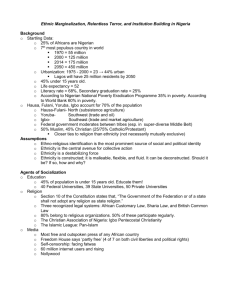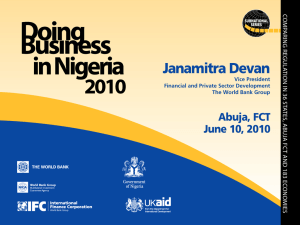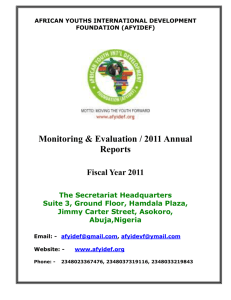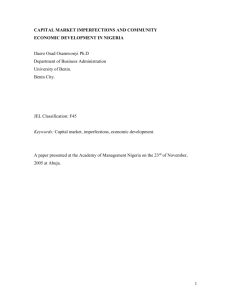in Sub-Saharan Africa
advertisement
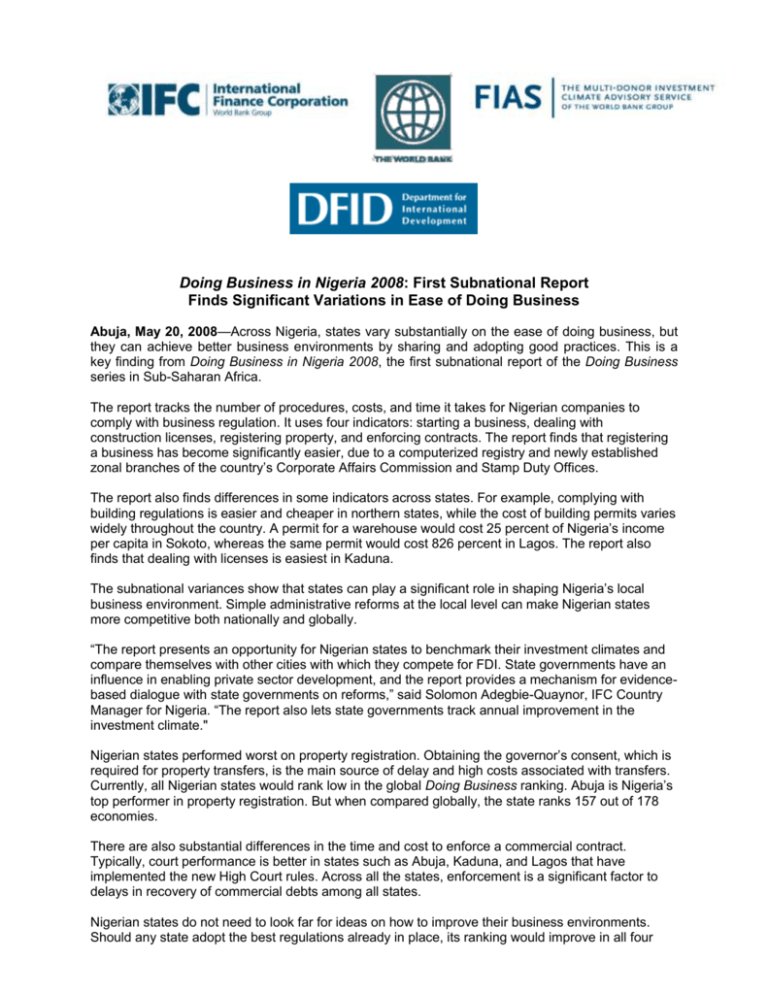
Doing Business in Nigeria 2008: First Subnational Report Finds Significant Variations in Ease of Doing Business Abuja, May 20, 2008—Across Nigeria, states vary substantially on the ease of doing business, but they can achieve better business environments by sharing and adopting good practices. This is a key finding from Doing Business in Nigeria 2008, the first subnational report of the Doing Business series in Sub-Saharan Africa. The report tracks the number of procedures, costs, and time it takes for Nigerian companies to comply with business regulation. It uses four indicators: starting a business, dealing with construction licenses, registering property, and enforcing contracts. The report finds that registering a business has become significantly easier, due to a computerized registry and newly established zonal branches of the country’s Corporate Affairs Commission and Stamp Duty Offices. The report also finds differences in some indicators across states. For example, complying with building regulations is easier and cheaper in northern states, while the cost of building permits varies widely throughout the country. A permit for a warehouse would cost 25 percent of Nigeria’s income per capita in Sokoto, whereas the same permit would cost 826 percent in Lagos. The report also finds that dealing with licenses is easiest in Kaduna. The subnational variances show that states can play a significant role in shaping Nigeria’s local business environment. Simple administrative reforms at the local level can make Nigerian states more competitive both nationally and globally. “The report presents an opportunity for Nigerian states to benchmark their investment climates and compare themselves with other cities with which they compete for FDI. State governments have an influence in enabling private sector development, and the report provides a mechanism for evidencebased dialogue with state governments on reforms,” said Solomon Adegbie-Quaynor, IFC Country Manager for Nigeria. “The report also lets state governments track annual improvement in the investment climate." Nigerian states performed worst on property registration. Obtaining the governor’s consent, which is required for property transfers, is the main source of delay and high costs associated with transfers. Currently, all Nigerian states would rank low in the global Doing Business ranking. Abuja is Nigeria’s top performer in property registration. But when compared globally, the state ranks 157 out of 178 economies. There are also substantial differences in the time and cost to enforce a commercial contract. Typically, court performance is better in states such as Abuja, Kaduna, and Lagos that have implemented the new High Court rules. Across all the states, enforcement is a significant factor to delays in recovery of commercial debts among all states. Nigerian states do not need to look far for ideas on how to improve their business environments. Should any state adopt the best regulations already in place, its ranking would improve in all four indicators studied by the report. Higher rankings on the ease of doing business are associated with growth, more jobs, and a smaller informal sector. In the global Doing Business 2008 report, Nigeria—represented by Lagos—ranked 108 among 178 economies. “There is no better way to create growth and jobs for Nigerians than through improving the business environment for private enterprises. The report will provide a strong basis for dialogue among Nigerian stakeholders on how to move from analysis to action, so that jobs can be created soon,” said Onno Ruhl, World Bank Country Director for Nigeria. Doing Business in Nigeria 2008 is part of the Nigeria subnational investment climate program, which supports state governments in improving their business environments. This program is part of a country partnership strategy between the Nigerian government, the United Kingdom’s Department for International Development, and the World Bank Group. It aims to create momentum for reform through dialogue between the private and public sectors in participating states, as well as drive investments and growth in non-oil sectors and reduce poverty through shared sustainable economic growth. “A better investment climate is vital for accelerating growth and reducing poverty in Nigeria. The report should be a valuable resource to support efforts to further reform the investment climate at both federal and state level. We are delighted to be partners in this endeavor, said Eamon Cassidy, Head of the United Kingdom Department for International Development in Nigeria. The report is based on information provided by more than 200 lawyers, accountants, construction experts, private sector professionals, and public officials. For more information about the data and methodology, visit www.doingbusiness.org/Nigeria. For more information, please contact: In Abuja Steven R. Dimitriyev Tel: (09) 314 5269-75, 08055119711 E-mail: sdimitriyev@worldbank.org In Washington, D.C. Rebecca Ong Tel: (1) 202 458 0434 E-mail: rong@worldbank.org About the Doing Business Project Since 2003, Doing Business has contributed to more than 100 reforms around the world. The project is based on the efforts of more than 5,000 local experts—business consultants, lawyers, accountants, government officials, and leading academics around the world, who provided methodological support and review. For more information, visit www.doingbusiness.org.





